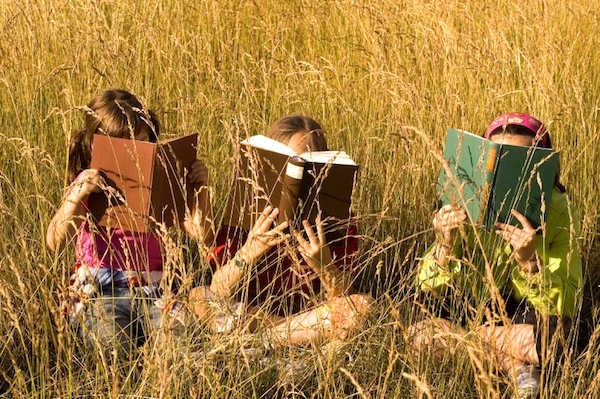
Whether you’re a book-club type of person or not, there’s an understandable appeal to having people to talk to over those “OMG DID THAT JUST HAPPEN” moments when you’re reading something. Reading is an intimate pursuit, but it doesn’t take place in a vacuum — it’s a part of your everyday life, which means where you read, when you read, and what’s going on in your life all colors your reading experience.
That seems to be the idea The Huffington Post is getting at with the introduction of its new Book Club, set to launch Jan. 3, which wants to make massive the idea of gathering in a gaggle to talk a book. The club will largely exist through HuffPo, but also on Twitter, Facebook, Flickr, and Instagram. That’s because, as Andrew Losowsky, books editor for the site, writes: “We want to know where and how you read, and what you can see and hear as you do so. We want to know where the story is taking you, and where your memories are taking the story.”
“Normal” book club asks the group to gather and chat, enjoy some tapas, and a nice Chardonnay. The talk turns to the themes of a book, what it means, the author’s intent, the narrative structure and the resonance we feel between characters. HuffPo is taking that conversation and blowing it out, in, well, HuffPo style. As spokesman Mario Ruiz told me over email, “HuffPost will be the central hub for all these conversations, with designated ‘Big News Pages,’ liveblogs and more. We’re also looking forward to taking conversations offline with readings, discussion groups and other events that we’ll be hosting.”
The Huffington Post wants to be the connector here. They see their value as a facilitator of the discussion by providing the structure for readers to share their reading experience. “We’ll ask readers to tweet where they are as they read (#HPBookClub), and to solicit Facebook comments from their friends about book themes and ideas. We’re also launching a Flickr group (called HuffPost Book Club), where people can post images of where they are reading, and how that changes their reading experience,” Ruiz said.
What the site gets out of this is what it almost always gets: traffic, eyeballs. It’s also not hard to imagine partnerships with publishers and authors, to cut deals for books or chats with writers. “It’s all part of our wider goal of starting and leading conversations, and our book club also has a specific goal of inspiring and encouraging more reading,” Ruiz wrote.
The project in many ways is similar to Jeff Howe’s 1book140 club at The Atlantic, but perhaps more structured. 1book140 is more of a true crowdsourced book club, where the titles are chosen through the group. HuffPost’s book club is more of a guided experience, with a selection of books and authors, as well as planned meet-ups. (You can never stray too far from the comforts of brie en crôute and pinot.)
Still, the value of the book club may be as an experiment in a kind of augmented reading. If you are reading a book about prohibition on a dock in Maine, or Jennifer Egan’s prize winner on a beach in Revere, Mass., (just to give two random examples), how does that change the way you digest a book? What about your state of mind? Is your perspective on The Marriage Plot different if you’re about to graduate from college? Does The Art of Fielding hit home if your favorite slugger is departing for a bigger contract on a different team?
What we have now is more ways to catalogue our time with a book. We can take stock of a passage in the moment of a particular revelation, or that sad/euphoric rush that comes after reading the final sentence. What HuffPost realizes is that we’re already doing all of that. We’re snapping pics of random artifacts that remind us of characters and throwing them up on Instagram or tweeting about missing chunks of time lost racing through chapters.
All of these external forces shape the way we read a book, what parts we latch onto the most and perhaps even the way we remember it. It only makes sense the book club, the catchall for all those insights and feelings born off the page, is adapting to what it means to read a book today.